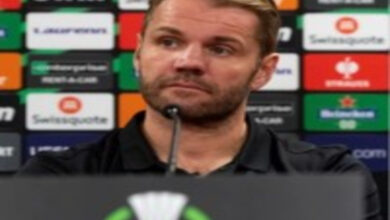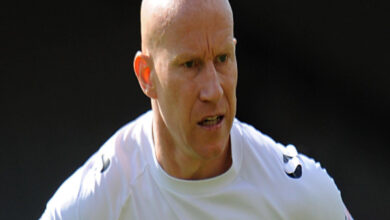Derek Riordan: The Journey of a Scottish Football Legend
Exploring the Career, Achievements, and Legacy of Derek Riordan, the Prolific Scottish Striker

Derek Riordan is a name synonymous with Scottish football. A gifted and sharp striker, Riordan made a significant impact during his football career, especially with Hibernian FC. Born on January 16, 1983, in Edinburgh, Derek Riordan’s career spanned numerous clubs and leagues, leaving behind a legacy of exceptional goal-scoring prowess. From his early days at Hibernian to his time in the Scottish Premier League with Celtic, Riordan’s journey as a footballer is marked by both triumphs and challenges. This article delves into the life, career, and achievements of Derek Riordan, examining his rise to prominence, his international career with Scotland, and the influence he has had on the game.
Derek Riordan: The Early Years
Derek George Riordan was born in Edinburgh, Scotland, and from an early age, his passion for football was evident. His talent in football led him to join the youth ranks at Hibernian FC, one of Scotland’s most respected football clubs. His breakthrough into the senior team came in 2001, marking the beginning of what would become a highly notable football career. As a youth, Riordan was known for his ability to find the back of the net, a talent that would serve him well throughout his professional career.
In 2003, Riordan had a short spell on loan at Cowdenbeath, a move that helped him gain valuable experience and further develop his skillset. His time with Cowdenbeath proved fruitful, as he honed his craft as a striker, ready to return to Hibernian with renewed confidence.
Derek Riordan at Hibernian FC
Riordan’s first major professional success came with Hibernian FC. During his initial spell with the club from 2001 to 2006, Riordan quickly established himself as a prolific goal-scorer. With 54 goals in 123 appearances, Riordan became a fan favorite and was recognized as one of the brightest young talents in Scottish football. His ability to score from all areas of the pitch, particularly his lethal free kicks, set him apart from his peers.
Riordan’s time at Hibernian also saw him become part of a successful team that competed regularly in the Scottish Premier League (SPL). While the club may not have won as many trophies during this period, Riordan’s performances ensured he was widely regarded as one of the league’s best forwards.
Move to Celtic FC
In 2006, Derek Riordan made the move to Celtic FC, one of Scotland’s most prestigious clubs, for a transfer fee of around £150,000. Joining Celtic was a significant step in Riordan’s career, as it offered him the opportunity to play in European competitions and contend for major trophies in the Scottish Premier League. However, despite the high expectations placed on him, Riordan found it difficult to secure a regular place in the starting XI at Celtic. This was due in part to the club’s highly competitive nature and the presence of established international stars.
While Riordan did manage to score some important goals during his time at Celtic, including key contributions in league matches and cup competitions, he was unable to make a lasting impact on the starting lineup. His time at Celtic was therefore somewhat frustrating, as he struggled to fully realize his potential in a team that was constantly aiming for success on both domestic and European fronts.
Return to Hibernian FC and Further Success
After his less-than-ideal stint at Celtic, Riordan returned to Hibernian in 2008, where he would go on to enjoy further success. His return to the club was a triumphant one, as he quickly regained his goal-scoring form. Over the course of the next three years, Riordan added 36 goals to his tally for Hibernian, solidifying his status as one of the club’s all-time greats.
During this period, Riordan played a pivotal role in helping Hibernian compete at the top of the Scottish Premier League, and his performances were regularly recognized by fans and pundits alike. His natural flair, combined with his technical ability, made him one of the most exciting players to watch in Scotland during the late 2000s and early 2010s.
International Career with Scotland
On the international stage, Derek Riordan earned recognition for his talents at various youth levels before being called up to the senior Scotland team. Although his time with the national team was brief, he managed to earn three caps for Scotland between 2005 and 2009. He made his senior debut in 2005 and was seen as a potential long-term prospect for the national team, particularly given his exceptional form with Hibernian.
Despite his relatively short international career, Riordan’s inclusion in the Scotland squad highlighted his growing reputation as one of Scotland’s top attacking talents. However, his limited appearances for the national team were largely due to stiff competition from other established players.
Later Years and Various Club Stints
After leaving Hibernian in 2011, Derek Riordan moved on to play for several different clubs in the later stages of his career. These included spells at St Johnstone, Bristol Rovers, Alloa Athletic, Brechin City, East Fife, York City, and Edinburgh City. Although his time at these clubs was not as high-profile as his earlier years at Hibernian and Celtic, Riordan continued to contribute with his goal-scoring ability and experience.
In 2019, Riordan retired from professional football, bringing an end to his long and varied career in the game. He ended his playing days at St Bernard’s, a club he joined for his final season.
Derek Riordan’s Post-Retirement Life
Since retiring from football, Derek Riordan has transitioned into a different line of work. One of his most notable ventures has been in the hospitality industry. In January 2020, Riordan took over the ownership of a popular bar near Hibernian FC’s stadium, The Four in Hand. He rebranded it as “R10rdan’s Sports Bar,” offering fans and visitors a space to celebrate and enjoy the beautiful game in a social setting.
Derek Riordan’s Legacy
Derek Riordan is widely regarded as one of the most gifted and charismatic strikers Scotland has produced in the last few decades. His ability to score goals from all positions on the field, his proficiency with free kicks, and his natural flair for the game earned him a reputation as one of the most exciting players in the Scottish Premier League during his peak years.
Even after retirement, Riordan’s name continues to be spoken with fondness by football fans, particularly those who supported Hibernian FC. His time at the club, marked by his memorable goals and remarkable performances, has cemented his legacy as one of the club’s greatest ever players.
Derek Riordan’s Age and Personal Life
Born on January 16, 1983, Derek Riordan is currently 42 years old. His age and experience played a significant role in shaping his career, both on and off the pitch. Known for his dedication and passion for the game, Riordan’s ability to adapt to various football environments—from his early days at Hibernian to his time in England and China—demonstrates the resilience that defined his playing career.
Derek Riordan: A Footballer’s Tale of Triumph and Struggle
As a footballer, Derek Riordan’s story is one of triumph, struggle, and resilience. He proved that dedication, hard work, and raw talent could take you to great heights in the world of football. While his career may not have been as glittering as some of his contemporaries, Riordan’s passion and commitment to the game are undeniable. His goal-scoring ability and his knack for creating moments of magic on the pitch made him a beloved figure in Scottish football.
Conclusion: Derek Riordan’s Impact on Scottish Football
Derek Riordan’s name will forever be remembered in the annals of Scottish football. Whether it was his time at Hibernian FC or his fleeting appearances for the Scottish national team, Riordan’s impact on the game cannot be overlooked. His passion, skill, and drive to succeed made him one of the most exciting players in his generation. Today, as he enjoys life after football, his legacy continues to inspire the next generation of Scottish footballers.



